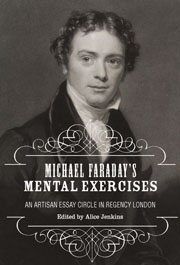Part Two - Contexts
Summary
Faraday, from the Correspondence (1812–16)
[The friendship between Michael Faraday and Benjamin Abbott was thoroughly rooted in their shared commitment to self-education and self-improvement. The two men met in or before 1812 at a lecture given by John Tatum, the London silversmith whose City Philosophical Society and scientific lectures played an important role in Faraday's education.1 Abbott was two years younger than Faraday, and a member of a Quaker, rather than a Sandemanian family. He was working as a clerk in the City when he met Faraday, but later went on to found a school in Bermondsey, and eventually became headmaster of a Quaker school in Hitchin. During the 1810s, Abbott was one of Faraday's most frequent correspondents (see above, p. 3, for discussion of the circumstances of the correspondence), though most of his replies to Faraday have been lost. In this very early letter, Faraday discusses the stylistic faults he sees in his own writing and rather playfully explains his hope that writing letters will cure him of them, citing the recommendation of the highly influential eighteenth-century Dissenting minister and writer on education, Isaac Watts, to support his arguments.]
From a letter to Benjamin Abbott, 12 July 1812:
I was lately engaged in conversation with a gentleman, who appeared to have a very extensive correspondence: for within the space of half an hour, he drew observations from two letters that he had received not a fortnight before; one was from Sicily; and the other from France.
- Type
- Chapter
- Information
- Michael Faraday's Mental ExercisesAn Artisan Essay-Circle in Regency London, pp. 174 - 246Publisher: Liverpool University PressPrint publication year: 2008

